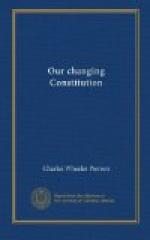The federal power has also been extended at the expense of the states through the use of the treaty-making prerogative. The subjects upon which Congress may legislate are limited by specific enumeration. The treaty-making power, however, is not thus limited. Treaties may cover any subject. It follows that while the Federal Government has no power (for example) to regulate the descent of real property in the various states the treaty-making power permits it, by treaties with foreign nations, to destroy the alienage laws of the states.[1] Another very recent example is afforded by the Migratory Bird Treaty with Great Britain.[2] One will search the Constitution in vain for any grant of power to the Federal Government to enact game laws. Nevertheless, under this treaty, many state game laws have been practically annulled.
[Footnote 1: Hauenstein v. Lynham, 100 U.S., 483.]
[Footnote 2: Sustained by the Supreme Court in Missouri v. Holland, 252 U.S., 416.]
But the most far-reaching method by which federal power under the Constitution has been extended has been the adaptation—some will say the perversion—by Congress of old grants of power to new ends. Under the spur of public sentiment Congress has discovered new legislative possibilities in familiar clauses of the Constitution as one discovers new beauties in a familiar landscape. The clause offering the greatest possibilities has been the so-called Commerce Clause, which grants to Congress power “to regulate commerce with foreign nations, and among the several states."[1] Under this grant of power Congress has enacted, and the courts have upheld, a great mass of social and economic legislation having to do only remotely with commerce. For example, the Sherman Act and other anti-trust legislation, ostensibly mere regulations of commerce, but actually designed for the control and suppression of trusts and monopolies; the federal Pure Food and Drugs Act, designed to prevent the adulteration or mis-branding of foods and drugs and check the abuses of the patent-medicine industry;[2] the act for the suppression of lotteries, making it a crime against the United States to carry or send lottery tickets or advertisements across state lines;[3] an act to prevent the importation of prize-fight films.[4] These are only a few among many similar statutes which might be mentioned. In all of them the motive is clear. There is no concealment about it. Their primary object is to suppress or regulate the trusts, lotteries, patent-medicine frauds. The regulation of commerce is merely a matter of words and legal form.
[Footnote 1: Art. I, Sec. 8.]
[Footnote 2: Hipolite Egg Company v. United States, 220 U.S., 45.]
[Footnote 3: Champion v. Ames, 188 U.S., 321.]
[Footnote 4: Weber v. Freed, 239 U.S., 325.]
Especially noteworthy is the rapidly expanding body of social legislation—federal Employers’ Liability Act, Hours of Service acts, Child Labor Law, White Slave Act and the like, all drawn with an eye to the commerce clause but designed to accomplish objects quite distinct from the regulation of commerce.




